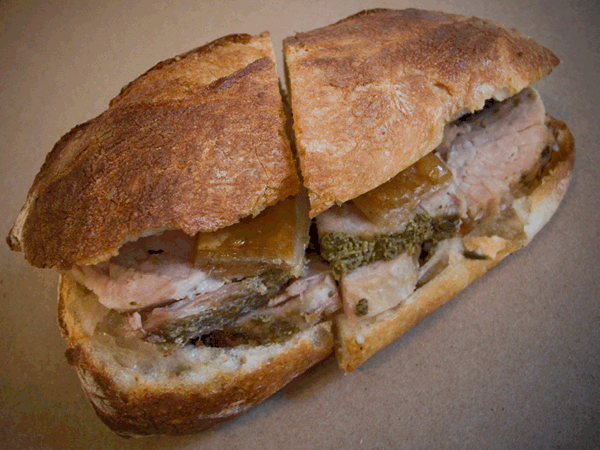I recently visited New York City to attend the ceremony for the James Beard Awards in food journalism. I had been nominated for one in the category of column writing. I didn’t bring home a Beard in the end, but I did notch a few victories in the field of the palate.
Here are the top food experiences of my brief and memorable trip.
 You don’t have to go to Italy for a great pork sandwich.Photo: PorchettaPorchetta
You don’t have to go to Italy for a great pork sandwich.Photo: PorchettaPorchetta
Years ago, I spent a spell working on a farm in Le Marche, a state along Italy’s Adriatic Coast. The farm was a short distance from the beach, and one searingly hot summer day, my friends and I rode bikes to the water. As we were leaving the tiny beach town, we came upon a street food vendor whose mobile stand featured what seemed like an enormous side of roasted hog. He would take slices of it and slip them into a sliced roll, under a sign declaring the word “porchetta.” Maybe we were just hungry; maybe the spare beauty of the Adriatic Coast softened us up; maybe the pounding heat dulled our critical faculties. Or maybe the vendor was just selling really good stuff. All three of us found the simple, greasy sandwiches, featuring just slow-cooked chunks of pork and crusty bread, tremendous, a kind of symbol of Italy’s glorious food culture against the fallen one we had left behind across the Atlantic. Imagine finding outstanding, cheap street food outside a beach town anywhere in the U.S.!
All of which is to say, I’ve been wanting to try the tiny East Village sandwich joint Porchetta for years. I am an aficionado of the writer Nancy Harmon Jenkins, who has authored outstanding cookbooks on Italy and the broader Mediterranean. Porchetta is owned and operated by her daughter Sara, who also recently opened a highly regarded restaurant focused on pasta. I had lunch at Porchetta early on a Saturday, before a massive queue formed. The menu is tiny — it offers porchetta sandwiches ($10), cooked greens ($5), potatoes roasted with bits of browned pork ($5), plus a few special sides.
I ordered the big three featured items. The East Village is a long way from the Adriatic, and now, perhaps, my critical faculties were a bit on overdrive. All three were deftly done and I loved them, but I had a few quibbles. The pork, while flavorful and beautifully seasoned, seemed a bit dry. I found myself wanting a sauce — specifically, a piquant salsa verde. The potatoes were crisp and beyond reproach; the greens wonderful and substantial if maybe a bit too salty and could have stood a little more cooking. At $5, the sides seemed at first glance pricey; they drove the cost of my simple lunch above $20. But portions are generous; two people could happily share a single order of each. All in all, I love Porchetta and applaud that skilled chefs are increasingly ripping away the white tablecloth and turning to small, accessible spots, a trend I wrote about last year.
 People getting down to great food and wine at The Ten Bells in the Lower East Side.Photo: The Ten BellsThe Ten Bells
People getting down to great food and wine at The Ten Bells in the Lower East Side.Photo: The Ten BellsThe Ten Bells
The trip allowed me to indulge another longtime obsession: natural wine, which can be defined as wine made without modern agriculture (pesticides, fertilizers, etc.) or modern winemaking (the various tech wizardry winemakers now often employ to manipulate flavor). Over the years, the wine world has increasingly homogenized, settling on “big,” high-alcohol wines that owe their flavor (“jammy fruit bomb,” in the iconic phrase of wine writer Robert Parker) more to the lab than to the earth. Natural wine can be seen as a kind of social movement against the homogenization of flavor and for the primacy of place. I laid out my case for natural wine in a piece last year.
New York City now has several spots that focus on the stuff. In my last visit, I checked out the wonderful Terroir (see here). This time, I was lucky enough to be invited to a post-Beard Awards party of food and wine writers at The Ten Bells, a lively establishment on the Lower East Side, east of Sara Delano Roosevelt Park. I was delighted to see the New York/L.A. food literati embracing natural wine in the first place.
As for The Ten Bells, I loved it. It’s small, just a bar and a few communal tables, packed, and loud with music and conversation. I never saw a menu — just chalkboards on the walls packed with names of wines from tiny Old World producers. There were also a few simple tapas scrawled out. Soon after we walked in, a prominent food writer in our party spoke to the owner, and a magnum of wine appeared from the Chinon region of France’s Loire Valley — a place celebrated for its delicate, pretty red wines and its refusal to pander to the global palate. And then a bunch of small plates came out — all outstanding, the highlight of which was a plate of baby eels, lashed with olive oil and chile flakes and served over arugula. By that point in the night, The Ten Bells felt more like a bar in Madrid or San Sebastián than a natural wine temple — packed, blaring rock and roll, great food and wine served like it’s no big deal. In other words, a place not to be missed.
 Pickle Petunia’s vegan coconut sandwich: That rarest of things, a truly radical cookiePickle Petunia
Pickle Petunia’s vegan coconut sandwich: That rarest of things, a truly radical cookiePickle Petunia
Last year, I wrote about the trend in New York of people shaking off the economic downturn and creating their own jobs through cottage cooking businesses. The city is full of highly skilled cooks — many of whom can’t or don’t want to be absorbed by the restaurant industry. Instead of idling their skills, some are putting them to work and bringing their goods to market in a variety of ways — a great benefit for the city’s residents.
The most memorable thing I ate on this trip came from a classic example of this trend: a “Vegan Chocolate Coconut Sandwich Cookie” from Pickle Petunia, the pastry business of Brooklyn resident Annie Petunia. She’s a trained chef and inspired cook who uses top-notch ingredients, and she sells her stuff on Etsy and at a few (not nearly enough) Brooklyn cafes. Petunia’s neighbor is my close friend James, who set up a tasting at his apartment. I hope my vegan allies will forgive me for the fact that while perusing Pickle Petunia’s roster of goods, the vegan sandwich cookie appealed to me least. My imagination leapt to “Dulce de Leche Brownies” and “Lemon Curd Sandwich Cookies.”
Everything was fantastic. But this vegan sandwich cookie — my God. The presence of coconut — both in the two outer layers and in the cream filling — absolutely trounces any fear that a vegan treat might lack richness. Used deftly, coconut can make you forget about the existence of butter. In this product, coconut reaches a kind of apotheosis — its essence is shifted into the unlikely form of the sandwich cookie, tempered and contrasted with just the right amount of salt and a touch of chocolate. The first shock came from biting into this masterpiece. The second came when Annie revealed the ingredients. Not only does it contain no animal products; it also contains no wheat flour. Instead, its outer layers are made of a combination of stuff like chickpea flour. This is nothing short of a radical cookie — one I never would have been attracted to based on a list of ingredients. Its existence brings glory to the city from which it sprang.



